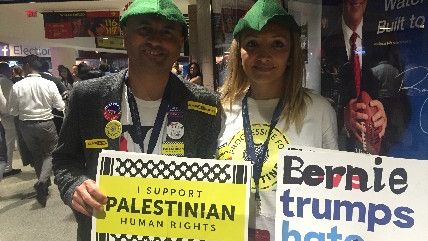Many Bernie Sanders Delegates Protest DNC Platform's Lack of Support for Palestinians
"Our unlimited support for Israel is very unreasonable and it distorts the understanding of the reality on the ground," one delegate tells Reason.


A big part of the reason Bernie Sanders stuck around in the primary process for as long as he did was to ensure the inclusion of a number progressive issues into the Democratic Party platform that otherwise stood no chance of being included. His stubborn (and often wrongheaded) longevity paid off in a number of ways—he got Hillary Clinton to embrace a $15 minimum wage, for example. But one plank his supporters could not get adopted to the platform was a call for "an end to [Israeli] occupations and illegal settlements" in the West Bank and East Jerusalem.
Though the five Sanders supporters on the platform drafting committee were able to get the language included in the draft, it was defeated 73-95 at a DNC conference earlier this month, and a substantial number of Sanders delegates have been sporting "I Support Palestinian Human Rights" signs, buttons, and stickers at the Democratic National Convention (DNC) to express their dissatisfaction with the party's current policy.
One of these Sanders supporting delegates, Ayman Eldarwish of Virginia (who described himself as an American-born of Arab descent) told Reason, "We are disappointed that it did not enter the platform of the Democratic Party. We understand the dynamics of our country (but) the justice scale has to find its resting place correctly." Eldarwish added, "Our unlimited support for Israel is very unreasonable and it distorts the understanding of the reality on the ground. There are people without a land and freedom. They have to find their place on Earth, just like the Israelis want."
Walter Conklin from Rhode Island said he thought the U.S.' position regarding Israel and the Palestinians was "absurd," and that despite the violence perpetrated by both sides, there needs to better recognition of the fact that Palestinians "are people."
Wife and husband delegates Aila Amany and Iyad Afalqa of California—both supporters of the democratic socialist from Vermont—were decked out in Robin Hood hats (get it?)—and told Reason of their disappointment with their party's platform.
The Jerusalem-born Afalqa says, "Bernie Sanders was the only presidential candidate who acknowledged the human rights of Palestinians. At the same time, he acknowledged Israel's right to exist, and as a Jewish man that was a big deal." He added that he believes the U.S. has a responsibility to be an "honest broker" in negotiations between Israel and the Palestinians, and that some of his fellow delegates were considering leaving the party because they see no hope that a Hillary Clinton administration will be that "honest broker."
Clinton, Afalqa says, will not be a "peace president, she will be a war president," adding that under her husband Bill's administration, "we were not at peace." He cited the sanctions on Iraq as a form of "collective punishment" on civilians and said he would not commit to voting for Clinton in the general election. Afalqa's wife, the Iranian-born Amany, says one reason she supported Sanders in the first place was because he refused to attend Israeli Prime Minister Benjamin Netanyahu's speech before Congress opposing the Iran nuclear deal.
The American political relationship with Israel is currently in a rockier state than it has been in decades, which can be seen not only in the pronounced personal tensions between President Obama and Netanyahu—which could very well have lasting implications for the once-intractable alliance between the two countries—but also because young American liberals are increasingly sympathetic to the Palestinian plight and no longer on board with U.S. support for Israel as a default position.
At this year's American-Israel Public Affairs Committee (AIPAC), Clinton went toe-to-toe with the many Republican presidential contenders in attendance in competition for who could be the most vocal supporter of Israel. In contrast, Sanders skipped the event entirely and gave a fairly measured but still controversial speech which condemned Hamas' attacks on civilians and its opposition to Israel's right to exist, but also condemned Israel's bombing campaigns which disproportionately harmed civilians.
Issues relating to the U.S.' handling of the Israeli/Palestinian conflict are unlikely going to be a dealbreaker for most Sanders supporters come Election Day, but the Palestinian cause has become increasingly important to the Democratic base, and if the unsatisfactory-to-all status quo continues, the issue could end up affecting future Democratic contests.


Show Comments (59)